
A resource with extensive information on all aspects of Sakharov's life. Arranged chronologically.
- Subject:
- Social Studies
- Material Type:
- Interactive
- Date Added:
- 12/01/2023

A resource with extensive information on all aspects of Sakharov's life. Arranged chronologically.

Amnesty International USA is a consciousness-raising organization for human rights. Its goals are lofty and may make many people uncomfortable as they read stories of grotesque crimes against human kind. This is an excellent site to introduce the global village concept to students. The organization offers many ways in which concerned citizens can get involved. There is also a Youth section that encourages student action and involvement. Be aware that this organization has its own definite viewpoints that may not be shared by all. However, issues are presented that would make excellent topics for debate and discussion.
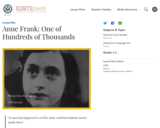
Drawing upon the online archives of the U.S. Holocaust Museum, this lesson helps students to put the events described by Anne Frank into historical perspective, and also serves as a broad overview of the Nazi conquest of Europe during World War II. After surveying the experiences of various countries under Nazi occupation, the lesson ends with activities related specifically to the Netherlands and Anne Frank.
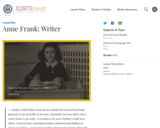
This lesson concentrates on Anne Frank as a writer. After a look at Anne Frank the adolescent, and a consideration of how the experiences of growing up shaped her composition of the Diary, students explore some of the writing techniques Anne invented for herself and practice those techniques with material drawn from their own lives.

Follow Clemencia Carabali, a community activist from Cauca, as she travels to Washington, D.C to share with congressional staffers the perspective of Cauca's residents- while the Colombian government has one story to tell, many of its residents have a very different and untold story. [3:25]

Official site for the Council on Europe. It provides information on Committee of Ministers, Parliamentary Assembly, and Human Rights Court.
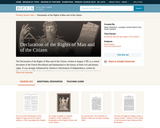
This collection uses primary sources to explore the Declaration of the Rights of Man and of the Citizen. Digital Public Library of America Primary Source Sets are designed to help students develop their critical thinking skills and draw diverse material from libraries, archives, and museums across the United States. Each set includes an overview, ten to fifteen primary sources, links to related resources, and a teaching guide. These sets were created and reviewed by the teachers on the DPLA's Education Advisory Committee.

Canada plays a significant role in the United Nations efforts to ensure human rights are respected globally. This webpage lists links to important official Canadian government documents that guide Canadian policy and cooperation in human rights treaties and reports.

In this lesson, students will explore Eleanor Roosevelt's many national and international contributions. They will learn how Eleanor Roosevelt used her positions as First Lady and United Nations diplomat to ensure that the powerless had a voice in American and global politics.

This video from Women, War & Peace demonstrates the power of women and suggests that in today's world, especially with the evolution of communication, the presence of women at peace talks is necessary and inevitable. [7:44]
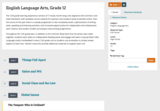
The 12th grade learning experience consists of 7 mostly month-long units aligned to the Common Core State Standards, with available course material for teachers and students easily accessible online. Over the course of the year there is a steady progression in text complexity levels, sophistication of writing tasks, speaking and listening activities, and increased opportunities for independent and collaborative work. Rubrics and student models accompany many writing assignments.Throughout the 12th grade year, in addition to the Common Read texts that the whole class reads together, students each select an Independent Reading book and engage with peers in group Book Talks. Language study is embedded in every 12th grade unit as students use annotation to closely review aspects of each text. Teacher resources provide additional materials to support each unit.

Who decides who among us is civilized? What rules should govern immigration into the United States? Whom should we let in? Keep out? What should we do about political refugees or children without papers? What if they would be a drain on our economy?
ACCOMPLISHMENTS
Students read William Shakespeare’s play The Tempest and write a short argument about who in the play is truly civilized.
Students participate in a mock trial in which they argue for or against granting asylum to a teenage refugee, and then they write arguments in favor of granting asylum to one refugee and against granting it to another.
Students read an Independent Reading text and write an informational essay about a global issue and how that relates to their book.
GUIDING QUESTIONS
These questions are a guide to stimulate thinking, discussion, and writing on the themes and ideas in the unit. For complete and thoughtful answers and for meaningful discussions, students must use evidence based on careful reading of the texts.
What role do national identity, custom, religion, and other locally held beliefs play in a world increasingly characterized by globalization?
How does Shakespeare’s view of human rights compare with that in the Universal Declaration of Human Rights?
Who is civilized? Who decides what civilization is or how it’s defined?
How do we behave toward and acknowledge those whose culture is different from our own?
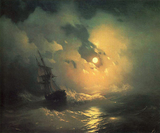
In this lesson, after being introduced to the unit, students will begin reading act 1 of The Tempest with the goal of understanding who the characters are and what happens. They’ll begin to chart the characters and find useful vocabulary.

The laws that govern and the social norms that regulate society are not always fair, legal, moral, or ethical. What is a person to do about all this injustice? What are the hazards of righting injustices or changing social norms? And what are the dangers of doing nothing?
ACCOMPLISHMENTS
Students read and annotate Antigone, “Letter from a Birmingham Jail,” and Pygmalion.
Students write a literary analysis showing the effect of social class or the law on a character’s life.
GUIDING QUESTIONS
These questions are a guide to stimulate thinking, discussion, and writing on the themes and ideas in the unit. For complete and thoughtful answers and for meaningful discussions, students must use evidence based on careful reading of the texts.
How do social class and legal institutions shape literary characters’ lives (and presumably our lives)?
How does social class affect a person in dealing with the law (protect a person, hurt a person)?
How is social class determined in America and in other places in the world?
BENCHMARK ASSESSMENT: Cold Read
During this unit, on a day of your choosing, we recommend you administer a Cold Read to assess students’ reading comprehension. For this assessment, students read a text they have never seen before and then respond to multiple-choice and constructed-response questions. The assessment is not included in this course materials.
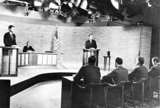
In this lesson, you will administer a Benchmark Assessment (Cold Write) to determine what students already know about argument writing. Students will respond to a prompt, and then you will assess each student’s argument, using the scoring guide, as a measure of early work. Students will have opportunities to write arguments throughout the year, during which they will have instruction on how to revise and edit their pieces. The information you gain from scoring this benchmark piece of writing will guide you in tailoring your writing instruction to individual student needs.

Students watch a 19-minute documentary that tells the story of Mohammed Alsaleh, a young Syrian refugee granted asylum in Canada in 2014, who is now counseling newly arrived refugees. In this lesson, students explore through classroom discussions the themes of cultural displacement, human rights, and resilience. Reflective writing prompts are also included for students to demonstrate their understanding of the story.

Students watch a 19-minute documentary that tells the story of Mohammed Alsaleh, a young Syrian refugee granted asylum in Canada in 2014, who is now counseling newly arrived refugees. [19:24]

Through two activities and a short biographical video, students will understand Helen Keller's accomplishments.

This primary document is a copy of the Helsinki Agreements of 1975 which recognized the borders in central and Eastern Europe that were set up since the end of WWII. They show the acceptance of the Soviet influence in Eastern Europe. and called for protection of the human rights for all citizens of the nations signing the agreement.

Human rights play a major role in how a country is viewed on the world stage. [3:28]